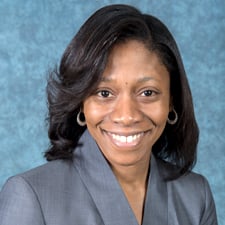Physicians are privileged to see patients at their most vulnerable, to reshape lives and continually revitalize the nation’s health system. In a challenging practice environment, physicians remain driven by the power of healing and the indelible connections they form with patients and families.
The AMA Wire® “When I Knew Medicine Was My Calling” series profiles a wide variety of doctors, offering a glimpse into the lives of the busy women and men navigating new courses in their careers and in American medicine. No matter their age, their specialty or their career stage, they were born to do this and they tell us why.
Share a moment with: Fatima Cody Stanford, MD, MPH, MPA, obesity medicine physician for children, adults and adolescents at Massachusetts General Hospital, Boston.
I was born to: Improve the health of humankind
The moment I knew medicine was my calling: At the age 3, I remember being asked by my great aunt what I wanted to be when I grew up. I told her that I wanted to be a doctor. She was quite disappointed in my selection, as she was a nurse. She inquired as to why I did not want to pursue that career path. I very clearly stated to her at the time that I felt as though the doctor was the leader of the team and ultimately responsible for the delivery of care to the patient. Now, I'm not quite sure I stated it so eloquently at the time, but I do recall this conversation with great detail—even to this day.
An experience from residency that confirmed my calling as a physician: When I was a resident physician, I cared for a 45-year-old woman who struggled with severe obesity. I had been working with her for approximately three years, and we never could make any major strides as it related to her weight through behavioral means. Once, I ran into her in the grocery store and took it upon myself to survey her grocery cart to check for the quality of food. It was at this time that I recognized the significant weight bias that I and others harbored toward persons with excess weight as it related to their food intake. Her grocery cart was one of the most virtuous I have seen: lots of lean protein, vegetables, whole grains and occasional fruit. This was one of the defining moments that led me to a career in obesity medicine.
An experience from medical school that kept me going: In medical school, I was often told that I should minimize my expectations, since striving for challenging goals would only lead to disappointment. Thus, I chose the alternate pathway, and I continue to strive for the highest heights possible. I've never looked back.
My source of inspiration: My inspiration comes from my spiritual relationship with Christ; my relationships with my maternal grandmother (deceased), husband, father, mother, sister; and my desire to make a lasting impact on medicine.
My hope for the future of medicine: I truly hope that we can advance the health of patients using a multidisciplinary, multi-sector, cost-sensitive approach, with an emphasis on the elimination of health disparities and the treatment of our nation’s most pervasive disease,obesity.
The hardest moment in medicine and how I got past it: I lost my maternal aunt to breast cancer at the beginning of my second week of medical school. We were incredibly close, and it was challenging to move forward with a focus on my studies so early on in school. Yet I knew that my perseverance would allow me to help patients in the future.
My favorite experience working with the medical team: My work at the Massachusetts General Hospital Weight Center is rewarding in that we use a multi-disciplinary approach to address the health needs of those who struggle with weight. We incorporate the input of obesity medicine physicians, psychologists, dietitians and bariatric surgeons to ensure the optimal outcome for the patient.
The most challenging aspects of caring for patients: Unfortunately, we are not always able to help patients achieve a desired goal. I feel quite frustrated when we are unable to help a patient. It does encourage me to continue to fight for their health and to help solve conundrums that allow us to better treat patients.
The most rewarding aspect of caring for patients: I truly enjoy helping to improve the quality of life of patients. It brings me sheer joy.
The skills every physician should have but won’t be tested for on the board exam: I feel as though every physician should have empathy. Most of us will never experience the medical challenges of many of our patients, but if we have empathy, we can try to understand their plight and provide the best possible care for patients.
One question students should ask themselves before pursuing medicine: Medicine is an all-consuming yet very rewarding career path. If you are not vested and giving your all every day, all day, I would consider another career path.
A quick insight I would give students who are considering medicine: Find ways to be time-efficient. You always have more things to do than you have time to do them in. But if you are efficient with your time, you will navigate through all the demands that will be placed before you.
Mantra or song to describe my life in medicine: “Survivor,” by Destiny's Child.




